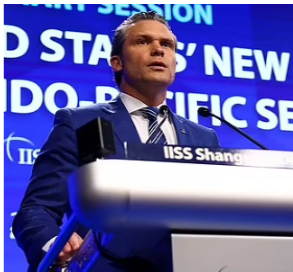
US Defense Secretary Pete Hegseth issued a chilling warning on the China threat during a defense summit in Singapore.
| Published May 31, 2025
At the 2025 Shangri-La Dialogue in Singapore, U.S. Defense Secretary Pete Hegseth delivered a compelling address warning of China’s growing military assertiveness and its potential implications for regional stability. He emphasized the urgency for Indo-Pacific nations to bolster their defense capabilities in response to what he termed a “real and potentially imminent” threat from Beijing.
Key Points from Hegseth’s Address
-
Imminent Threat from China: Hegseth stated that China’s military actions, particularly around Taiwan, suggest preparations for potential conflict. He highlighted increased Chinese military activities and the possibility of Beijing attempting to alter the regional balance of power through force.
-
U.S. Commitment to Taiwan: Echoing President Trump’s stance, Hegseth reiterated that any Chinese aggression toward Taiwan would have “devastating consequences” for the Indo-Pacific region and the world. He underscored the U.S.’s unwavering support for Taiwan’s defense.
-
Call for Increased Defense Spending: Hegseth urged Indo-Pacific allies to enhance their defense budgets, drawing parallels to NATO members in Europe who have increased their defense spending. He emphasized that while the U.S. remains committed to the region, allies must share the responsibility of regional security.
-
Strategic Rebalancing: The Defense Secretary discussed the Trump administration’s strategy of focusing more on the Indo-Pacific, allowing Europe to manage its own security concerns. This approach aims to ensure that the U.S. can effectively address challenges posed by China’s actions in the region.

Hegseth urged other countries to bulk up their defense and said that the US wouldn’t let China invade Taiwan

Hegseth claimed that China, under the leadership of President Xi Jinping, was ‘preparing to potentially use military force to alter the balance of power in the Indo Pacific’
The implications of Defense Secretary Pete Hegseth’s warnings and statements at the Shangri-La Dialogue are wide-ranging and significant for regional and global security:
Implications for Regional Security
Hegseth’s remarks underscore a shift in U.S. defense policy, emphasizing a more active role in the Indo-Pacific. The call for increased defense spending among allies reflects a recognition that collective security efforts are essential in countering China’s assertiveness. The emphasis on Taiwan highlights its strategic importance and the potential consequences of any Chinese military action.
1. Escalation of U.S.-China Tensions
-
Hegseth’s blunt characterization of China’s military activities as an “imminent threat” could further escalate tensions between the U.S. and China, increasing the risk of confrontation—especially around Taiwan and the South China Sea.
2. Strengthened U.S. Commitment to Taiwan
-
The U.S. pledging clear and strong support for Taiwan signals to Beijing that any aggression will be met with serious consequences, potentially deterring Chinese military action but also raising stakes if a conflict occurs.
3. Increased Defense Spending by Indo-Pacific Allies
-
Hegseth’s call for allies to increase their defense budgets reflects a strategic push for burden-sharing, potentially leading to greater military modernization and regional security cooperation among countries like Japan, South Korea, Australia, and ASEAN members.
4. Shift in Global Military Focus
-
The emphasis on Indo-Pacific security marks a continued pivot in U.S. defense priorities, moving away from Europe-centric strategies toward countering China’s rise in Asia, which could reshape alliances and global power dynamics.
5. Potential for Regional Arms Race
-
Increased defense spending and military buildup by multiple countries in response to perceived threats may fuel an arms race, raising the possibility of destabilization in a region already fraught with territorial disputes.
6. Impact on Diplomatic Relations and Trade
-
Heightened military posturing and the risk of conflict could strain diplomatic ties and impact trade routes, notably through the South China Sea, affecting global supply chains and economic stability.
Overall Takeaway:
The U.S., under leaders like Defense Secretary Pete Hegseth, is doubling down on a robust Indo-Pacific strategy aimed at countering what it views as an immediate and serious threat from China’s military ambitions—especially regarding Taiwan. This approach involves urging regional allies to boost their defense capabilities and signaling firm U.S. support for Taiwan’s security.
While this stance aims to deter Chinese aggression and maintain regional stability, it also risks intensifying military competition and geopolitical tensions in one of the world’s most critical and volatile regions. The coming years will be pivotal in shaping the balance of power in Asia and the global order.
SOURCES: DAILYMAIL ONLINE – Hegseth sounds alarm on China’s ‘imminent’ Taiwan invasion
REUTERS – Pentagon chief warns of imminent China threat, pushes Asian allies to boost defence spending
THE WALL STREET JOURNAL – Hegseth Warns of ‘Devastating Consequences’ Should China Seek to ‘Conquer’ Taiwan





Be the first to comment